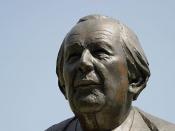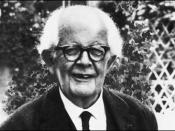During the 1920s, a biologist named Jean Piaget proposed a theory of cognitive development of children. He caused a new revolution in thinking about how thinking develops. In 1984, Piaget observed that children understand concepts and reason differently at different stages. Piaget stated children's cognitive strategies which are used to solve problems, reflect an interaction BETWEEN THE CHILD'S CURRENT DEVELOPMENTAL STAGE AND experience in the world.
Research on cognitive development has provided science educators with constructive information regarding student capacities for meeting science curricular goals. Students which demonstrate concrete operational thinking on Piagetian tasks seem to function only at that level and not at the formal operational level in science. Students which give evidence of formal operational thinking on Piagetian tasks often function at the concrete operational level in science, thus leading researchers to conclude that the majority of adolescents function at the concrete operational level on their understanding of science subject matter.
In a study by the National Foundation of subjects in Piaget's Balance Task were rated as being operational with respect to proportional thought development. In addition, seventy-one percent of subjects did not achieve complete understanding of the material studied in a laboratory unit related to chemical solubility. The unit delt with primary ratios and proportions, and when overall physical science achievement was considered, about forty-three percent of the formal operational studies were not able to give simple examples of the problem that were correctly solved on the paper and pencil exam (Inhelder & Piaget, 1958, p. 104).
Piaget was primarily concerned with the developmental factors that characterize the changes in the child's explanations of the world around him or her. Piaget's early research showed
three parallel lines of development. First, from an initial adualism or confusion of result of the
subject's own activity with...


